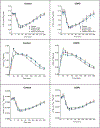Whole body protein anabolism in COPD patients and healthy older adults is not enhanced by adding either carbohydrates or leucine to a serving of protein
- PMID: 30150004
- PMCID: PMC6377853
- DOI: 10.1016/j.clnu.2018.08.006
Whole body protein anabolism in COPD patients and healthy older adults is not enhanced by adding either carbohydrates or leucine to a serving of protein
Abstract
Background & aims: Carbohydrates (CHO) and leucine (LEU) both have insulinotropic properties, and could therefore enhance the protein anabolic capacity of dietary proteins, which are important nutrients in preventing muscle loss in patients with Chronic Obstructive Pulmonary Disease (COPD). LEU is also known to activate protein anabolic signaling pathways independent of insulin. Based on our previous findings in COPD, we hypothesized that whole body protein anabolism is enhanced to a comparable extent by the separate and combined co-ingestion of CHO and LEU with protein.
Methods: To disentangle the protein anabolic effects of CHO and/or free LEU when co-ingested with a high-quality protein, we studied 10 patients with moderate to very severe COPD and dyspnea (GOLD: II-IV, mMRC dyspnea scale ≥ 2), at risk for muscle loss, and 10 healthy age- and gender-matched controls. On four occasions, in a single-blind randomized crossover design, each subject ingested a drink containing 0.6 g/kg fat-free mass (ffm) hydrolyzed casein protein with, a) no add-ons (protein), b) 0.3 g/kg ffm CHO (protein + CHO), c) 0.095 g/kg ffm leucine (protein + LEU), d) both add-ons (protein + CHO + LEU). Whole body protein breakdown (PB), protein synthesis (PS), and net protein balance (= PS - PB) were measured by IV primed and continuous infusion of L-[ring-2H5]-phenylalanine and L-[13C9,15N]-tyrosine. L-[15N]-phenylalanine was added to the protein drinks to measure splanchnic extraction.
Results: In both groups, whole body PS, PB and net protein balance responses were comparable between the four protein drinks, despite higher postprandial plasma LEU concentrations for the LEU supplemented drinks (P < 0.05), and higher insulin concentrations for the CHO supplemented drinks as compared to the protein only drink (P < 0.05).
Conclusions: Adding CHO and/or LEU to a serving of high-quality protein does not further augment whole body protein anabolism in dyspneic COPD patients at risk for muscle loss or healthy older adults.
Trial registry: ClinicalTrials.gov; No. NCT01734473; URL: www.clinicaltrials.gov.
Keywords: Anabolic response; COPD; Carbohydrate; Coingestion; Leucine.
Copyright © 2018 Elsevier Ltd and European Society for Clinical Nutrition and Metabolism. All rights reserved.
Conflict of interest statement
Figures






References
-
- Engelen MP, De Castro CL, Rutten EP, Wouters EF, Schols AM, Deutz NE. Enhanced anabolic response to milk protein sip feeding in elderly subjects with COPD is associated with a reduced splanchnic extraction of multiple amino acids. Clinical6 nutrition (Edinburgh, Scotland). 2012;31(5):616–24. - PMC - PubMed
-
- Engelen MP, Deutz NE, Mostert R, Wouters EF, Schols AM. Response of whole-body protein and urea turnover to exercise differs between patients with chronic obstructive pulmonary disease with and without emphysema. Am J Clin Nutr. 2003;77(4):868–74. - PubMed
-
- Engelen MP, Rutten EP, De Castro CL, Wouters EF, Schols AM, Deutz NE. Altered11 interorgan response to feeding in patients with chronic obstructive pulmonary disease. Am J Clin Nutr. 2005;82(2):366–72. - PubMed
-
- Jonker R, Deutz NE, Erbland ML, Anderson PJ, Engelen MP. Hydrolyzed casein and whey protein meals comparably stimulate net whole-body protein synthesis in COPD patients with nutritional depletion without an additional effect of leucine co-ingestion. Clinical nutrition (Edinburgh, Scotland). 2014;33(2):211–20. - PMC - PubMed
Publication types
MeSH terms
Substances
Associated data
Grants and funding
LinkOut - more resources
Full Text Sources
Other Literature Sources
Medical

